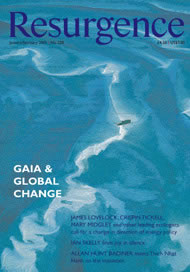WE START THE new year with a wake-up call to the world. Global warm- ing is a far greater threat to our security than terrorism. This is not a statement from a few concerned ecolog-ists - it comes from the UK government's chief scientist, Sir David King. Global warming is a symptom of our disconnection from the Earth and its living systems. In this issue of Resurgence our contributors not only look at the symptoms, but also explore the causes of climate change.
Independent scientist James Lovelock, the author of Gaia theory, believes that the threat of global warming is so great that humanity must immediately cease its consumption of fossil fuels. He advocates a switch to nuclear power to fulfil our energy needs in the short to medium term, until we have developed alternative sustainable energy sources. This is a powerful and shocking indicator of the magnitude of the crisis we face.
Many Resurgence readers will find the nuclear option controversial, but the views of an eminent environmental scientist must be listened to, considered and debated. Peter Bunyard, an editor of The Ecologist, makes the counter-argument, suggesting that nuclear power may not provide the solutions we seek. Readers are invited to send their comments as Letters to the Editors.
The other articles go deeper into the complexity of climate change. Protection of biodiversity is a powerful way to address this issue. Stephan Harding explains how the intricate patterns of coexistence that have evolved over millennia are fundamental to keeping our delicate climatic systems in a state that supports life. Each loss of species disconnects one of the strands in the web of life and renders the whole system less able to adapt to change.
Not only are we rapidly consumingreserves of fossil fuels, we are also depleting the biomass of the planet. We are deforest- ing vast areas of the Earth, losing forests thatfunction as carbon absorbers and homes for biodiversity. David Wilkinson, a conservationist, suggests that we need to rethink our attitudes towards wilderness areas, and restore biomass to the planet. In fact, rethinking our attitudes towards Gaia is fundamental in addressing global change. Until we see ourselves as part of the 'Earthscape', as Anne Primavesi asserts, we will never accept our role in the 'Gaian Community'. In the same spirit as Primavesi, points out that considerations of ethics, values and visions are as essential to the question of climate change as practical ideas and technologies.
Thinking of technologies, many people are already coming up with revolutionary solutions. For instance, Amory Lovins of the Rocky Mountain Institute, Colorado www.rmi.org suggests that all vehicles should have solar panels on their roofs. As most vehicles are stationary for ninety per cent of the time, they could easily be connected up to the national grid, and become net energy producers, rather than net energy consumers. These vehicles could also be retrofitted to run on the electricity they generate. The whole concept of energy conservation and 'negawatts' then becomes a workable reality.
The Chinese character for crisis is 'danger and opportunity'. We need to wake up to the opportunities that face us.








